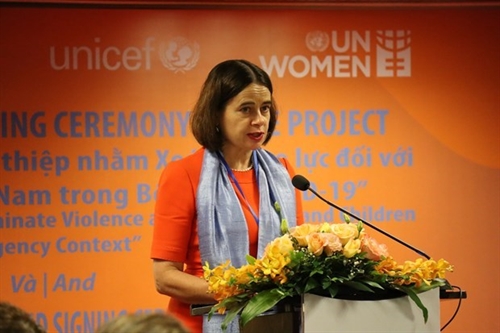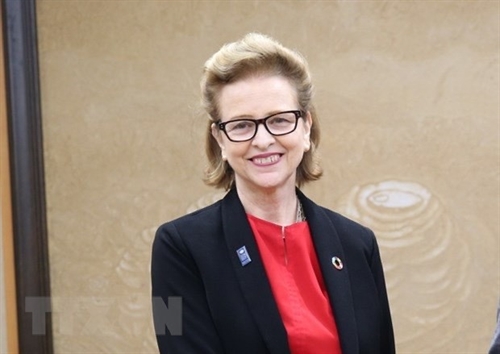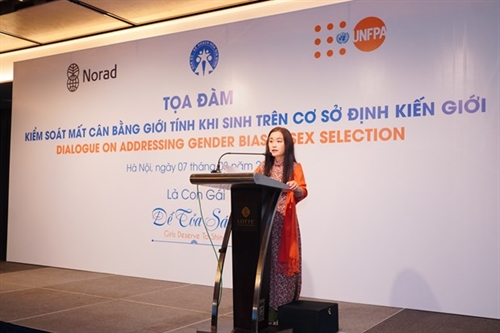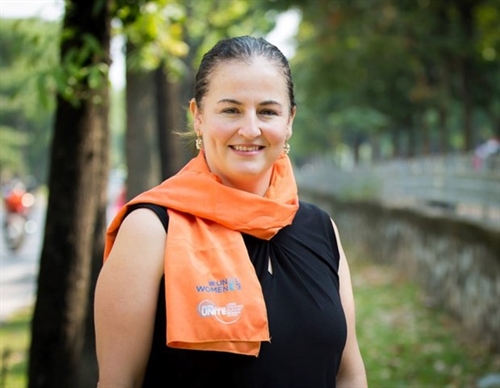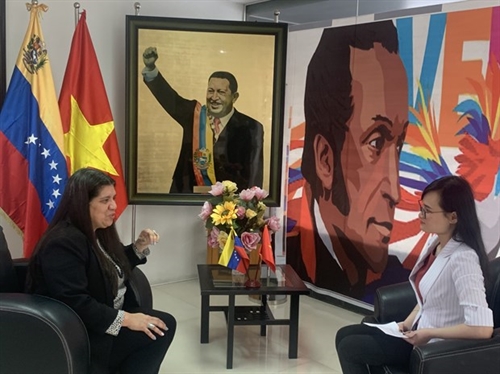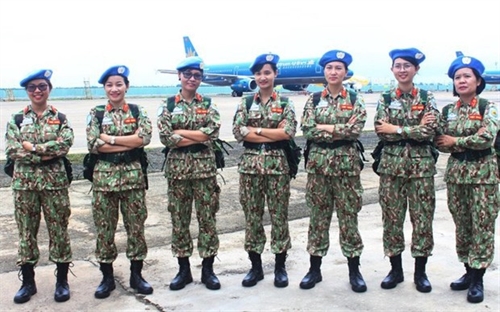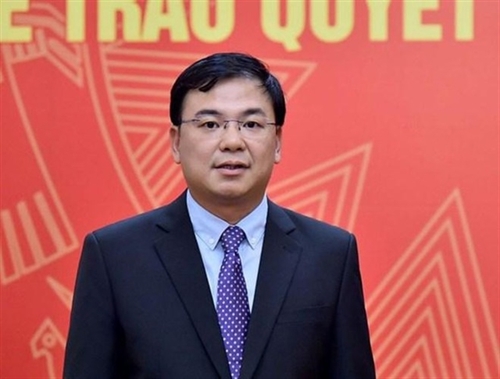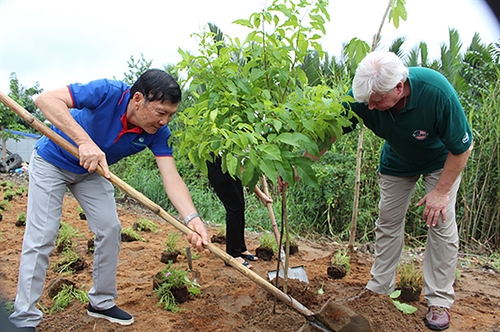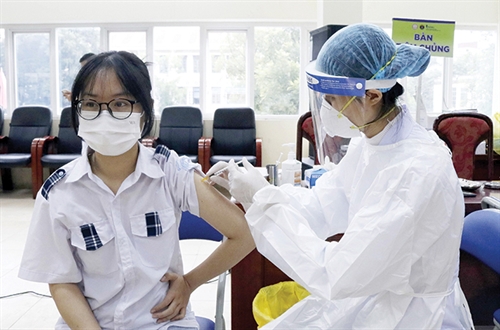Guaranteeing legitimate rights of women, both in family and society, is a consistent policy of the Vietnamese Party and State since the foundation of the Democratic Republic of Vietnam in 1945, now the Socialist Republic of Vietnam. The tireless efforts to ensure and promote gender equality have brought about great and substantial outcomes and been acknowledged by the international community.
Policies on gender equality
Policies on gender equality rolled out in Vietnam have kept up with different periods of time.
After President Ho Chi Minh read the Declaration of Independence declaring the birth of the Democratic Republic of Vietnam on September 2, 1945, the 1946 Constitution, the first of its kind in Vietnam, touched upon the issue of gender equality. Article 9 of the Constitution said women and men enjoy equal rights in all aspects.
Article 24 of the 1959 Constitution also stipulated rights and obligations of women, which also emphasized equal rights of women and men in politics, economy, culture, social affairs, and family.
Along with integrating women’s rights into fundamental rights of citizens, the 1980 Constitution had exclusive provisions on the rights of women. According to Article 57, citizens aged 21 years or older, regardless of their gender, can be elected to the National Assembly (NA) and all-level People’s Councils, the highest organs of state power at the central and local levels. Meanwhile, Article 63 said the State and the society are responsible for improving women’s political, cultural, scientific and technological knowledge, as well as promoting their careers, helping them raise their position in the society. With regard to labor policies, men and women performing the same job receive equal pay, and women can take a maternity leave before and after childbirth with full payment.
The 1992 Constitution, which was revised in 2001, retained the above-said regulations.
To concretize provisions of the Constitution, the Law on Gender Equality was passed in 2006, providing women’s rights more adequately, specifically and comprehensively.
Other laws have materialized the Constitution’s provisions, notably the 2006 Law on Social Insurance (revised in 2014), 2006 Law on Residence, 2007 Law on Domestic Violence Prevention and Control, and 2000 Law on Marriage and Family (revised in 2014), to name a few.
The 2013 Constitution provides detailed regulations on the rights of women, with Articles 14 thru 49 stipulating human rights and rights of citizens, including women.
The regulations emphasize equal and priority rights of women, like those in employment, job placement and retirement, helping women prove their capacity and avoid risks at work, in family and society.
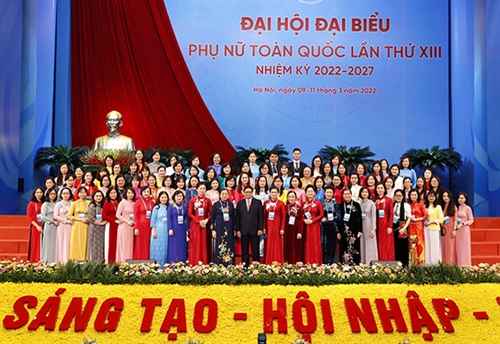 |
| Delegates to the 13th National Women’s Congress pose for a group photo__Photo: Thong Nhat/VNA |
Figures that speak
The 15th NA was elected in May 2021 with 499 deputies, including 151 women accounting for 30.26 percent of the total. This is the second time that female NA deputies have exceeded 30 percent. The first time was recorded in the 5th Legislature with 32.31 percent.
During the first tenure of the NA, female deputies made up only 3 percent. However, they had outstandingly performed their tasks.
The 14th Legislature has gone down in the 75-year history of the NA as the first time a woman was sworn in as Chair of the NA - Nguyen Thi Kim Ngan, and at the same time, another woman assumed the post of Vice Chair - Tong Thi Phong.
The number of female NA deputies holding leadership positions during the present tenure now represents nearly 40 percent of the total.
Meanwhile, women representatives in provincial-level People’s Councils make up 26.5 percent, up 1.37 percent from the previous term; and in district-level People’s Councils, 27.9 percent, a rise of 3.2 percent as compared with the previous tenure.
At the 13th National Party Congress, among the officially elected members of the Party Central Committee, 18 are female. Out of 63 secretaries of provincial-level Party Committees for the 2020-25 term, nine are female, the highest number so far.
Gender equality efforts acknowledged globally
Vietnam’s efforts in promoting gender equality have been acknowledged by the international community.
The country ranks 51st globally, fourth in Asia and first in the ASEAN Inter-Parliamentary Assembly in the ratio of female NA deputies.
Its gender equality index is also constantly rising as Vietnam claimed the 87th position out of the 153 countries surveyed for gender gap narrowing.
Vietnam has a greater percentage of women in senior leadership positions than the global average, according to Grant Thornton’s International Business Report.
In Vietnam’s middle-market companies, women hold 33 percent of senior leadership positions with the most common being personnel director (36 percent) and chief financial officer (32 percent). Globally, the rate is 29 percent.
Ninety-five percent of businesses in Vietnam have at least one woman in senior management, again above the global rate of 87 percent.
Significant advances in implementing sustainable development goals
In an interview with the Vietnam News Agency on the threshold of the 13th National Women’s Congress held on March 10 in Hanoi, Elisa Fernandez Saenz, UN Women Representative in Vietnam, said the Vietnamese Government has made significant advancements in implementation of sustainable development goals (SDGs), especially SDG5 on Gender Equality.
She also spoke highly of Vietnam’s efforts to enhance gender equality and women’s empowerment.
Vietnam has set up a solid legal framework conducive to gender equality, she said, stressing the significance of the Law on Gender Equality, the Law on Domestic Violence Prevention and Control, and the national strategy for gender equality for the 2021-30 period.
The official noted that over the past years, Vietnam has shown strong commitments and efforts to improve the status of the women in all spheres, including political affairs.
“We need to emphasize that Vietnam is now 4.7 percent higher than the global average of 25.5 percent of female parliamentarians, moving Vietnam from the 65th to the 54th in the global ranking,” Elisa highlighted, describing this as a remarkable achievement of the country in promoting gender equality and in the empowerment of women through the increase of women’s participation in parliament.
Regarding economic development, women have made a significant contribution to the economy since they constitute 47.7 percent of the labor force and make up 26.5 percent of the business owners and chief executive officers, much higher than the regional levels, the official noted.
Women’s equal representation and meaningful participation in the leadership positions and decision-making at all levels, in both public and private sectors, are essential for Vietnam to realize inclusively and sustainably its socio-economic development vision, to achieve SDGs, and to “leave no one behind”, Elisa said.
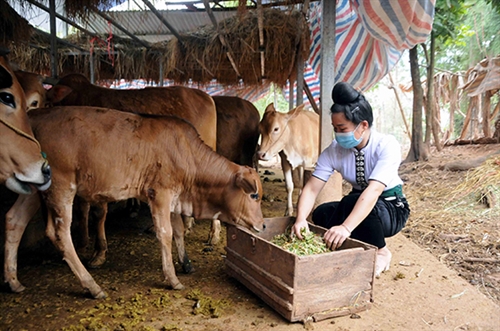 |
| Lo Thi Dien, a member of the Women’s Union of Bung Mo hamlet, Chieng Sang commune, Yen Chau district, Son La province, takes care of her family’s cow herd, which were bought with loans borrowed from the Vietnam Bank for Social Policies__Photo: Quang Quyet/VNA |
Women’s engagement in all aspects of life
Tatiana Pugh Moreno, Venezuelan Ambassador to Vietnam, told the Vietnam News Agency that she appreciated Vietnam’s national strategy on gender equality for the 2021-30 period, which aims to create favorable conditions and opportunities for women to engage in and benefit from all aspects of life, thus contributing to promoting the country’s sustainable development.
The diplomat highlighted the important role women have been playing throughout the national construction and defense of Vietnam. She said that while women in many countries around the world are still struggling to protect their own rights, in Vietnam, the Government has worked hard to build policies to ensure gender equality, considering it a demand and part of the human rights that need protecting and promoting. This shows that Vietnam has recognized the significance of the role of women in all areas of the political, economic and social life, she stressed.
The ambassador underlined that the role of women and gender quality issues were mentioned by President Ho Chi Minh right from 1930 when the Communist Party of Vietnam was founded. Today, during the country’s “Doi moi” (renewal) cause and economic development process, women are still affirming their role by actively engaging in and taking more leading positions in the political system, she noted.
Incremental progresses in promoting women’s leadership
Vietnam is making incremental progresses to increase women’s participation in elected bodies such as the NA and local People’s Councils, United Nations Development Program (UNDP) Resident Representative in Vietnam Caitlin Wiesen affirmed in an interview granted to the Vietnam News Agency.
She praised the Vietnamese Government’s efforts in empowering the role of women in rural and ethnic minority-inhabited regions.
UNDP Vietnam has worked closely with the Ministry of Labor, Invalids and Social Affairs and the Committee for Ethnic Minority Affairs in executing projects on building capacity and improving access to market for ethnic minority women owned businesses, Wiesen said.
Such projects have helped ethnic minority women design new products, increase quality and productivity, thereby improving livelihoods and income for themselves and other women in their supply chains, she noted.
“Women’s economic empowerment and the promotion of their financial inclusion in the digital age will play a critical role in helping governments and people achieve a bold, sustainable, resilient and gender-sensitive recovery. This, in turn, is foundational to achieving the SDGs and leaving no one behind in the context of the “new normal” of co-existing with COVID-19,” Wiesen said.
The UNDP Representative highlighted the expansion of access to credit which is critical for women-led household businesses and micro- and small-sized enterprises working in the informal sector, along with innovative solutions, such as supporting financial service providers including banking agents that serve these enterprises to bring digital financial services to under-served groups, especially in rural and ethnic minority areas.
These solutions should be designed and implemented in a gender-sensitive manner to address the chronic issues women-led enterprises face of having less access to credit than men and the risk of widening the “digital divide” between men and women, she said.
“Just like in politics, women’s participation in innovation and economic activities is crucial in Vietnam’s journey to sustainable gender equality,” Wiesen said, noting that increasing women’s role as producers, traders, and consumers in the economy impacts positively on inclusive growth for the country.
With Vietnam taking urgent actions as part of the COVID-19 recovery, there is an unprecedented opportunity to put gender equality at the heart of caring for people and the planet, Wiesen emphasized.
She also hailed Vietnam’s strong commitment to promoting women’s participation in UN peacekeeping operations.
Vietnam sent the first female staff officer to the UN Peacekeeping Mission in South Sudan in 2018 and since then the ratio of women in the Vietnamese peacekeeping forces has steadily increased and now been stabilized at ratios that are higher than those in other countries in the region, she said.
By March 2022, the number of Vietnamese women serving as UN Military Experts on Mission/Military observers is at 28.4 percent, 3.4 percent higher than the target (25 percent) set in the “Uniformed Gender Parity Strategy 2018-28”. Similarly, the ratio of women serving in contingent Troops (Field Hospital 3rd rotation) is 17.4 percent, surpassing the UN’s 2028 target (15 percent).
The UN Representative said as a non-permanent member of the UN Security Council for 2020-21, Vietnam played an important leadership role in the region and the world in promoting women in peacekeeping operations and the broader Women, Peace, and Security Agenda.-
